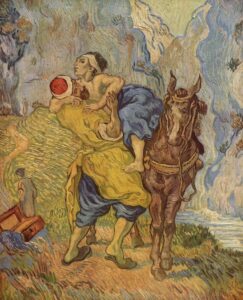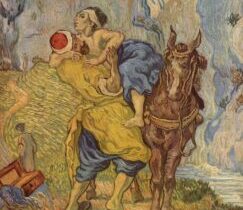Something Very Near to You
 Reading these words, “something very near to you,” I find myself wondering, what is very near to me? What do I treasure most? What is a fundamental part of me that might not even be consciously mine? Do I even know what is very near to me?
Reading these words, “something very near to you,” I find myself wondering, what is very near to me? What do I treasure most? What is a fundamental part of me that might not even be consciously mine? Do I even know what is very near to me?
As Moses and the Israelites approach the promised land after forty years of travels through the Sinai Peninsula and lands to the east of the Jordan River, he realizes that the time has come to pass the leadership of the community into younger hands. He is now old and the end of his days is at hand.
In this first reading for the Fifteenth Sunday in Ordinary Time, Moses gives some final instructions and his final plea/dream to the people. “If only you would heed the voice of the Lord … and keep his commandments…” (Dt 30:10-14) He calls on them to return once again to the Lord, “with all your heart and all your soul.”
Early in their travels, Moses had gone up to the mountaintop and received the tablets containing the Law from the Lord God. He brought the Law down to the people and it became the foundation of their way of life and traditions. Sometimes they followed it well. Other times not. Always it was the basis of their agreement, their Covenant, with God.
As it becomes obvious that Moses will not be leading them when they enter the new land, they must have wondered, who will now bring the Law to us? Who will be the intermediary with God? Where will our leader need to go to find God and bring instructions to us?
Moses corrects the notion that the Law by which they live is something mysterious and remote that needs to be found in the sky or across the sea, or in some other far-off land. No one needs to travel far to retrieve and bring it back to the people so they will know how to live. He tells them, “No, it is something very near to you, already in your mouths and in your hearts; you have only to carry it out.”
What is written in the Law?
St. Luke brings us a picture of what it means to live according to the Law. (Lk 10:25-37) A student of the Law, a person who had spent many years studying Jewish laws and tradition, asked Jesus a question. “Teacher, what must I do to inherit eternal life?” Jesus went right back to basics. “What is written in the law?” The man responded with a condensed statement of Mosaic law. “You shall love the Lord, your God, with all your heart, with all your being, and with all your strength, and with all your mind, and your neighbor as yourself.”
This answer was absolutely correct. No need to add anything more. No need to travel to the sky or across the sea. Love God and love your neighbor as yourself. Jesus assured the man that nothing more would be needed.
Then came the follow-up question, “Who is my neighbor?” This is one we all need to contemplate. Is my neighbor the person living next door, on my block, on the other side of the block, my village, my region of the country, my country? How far out do I need to go before those I meet cease to be my neighbor and I no longer need to love them?
Today we often hear, “There’s an app for that!” We might equally well say, “With Jesus, there’s a parable for that!”
 Jesus told a story. There was a man who was traveling from Jerusalem down to Jericho. This was a mountainous area, with lots of bandits along the way. He was attacked, beaten, robbed, and left half-dead beside the road.
Jesus told a story. There was a man who was traveling from Jerusalem down to Jericho. This was a mountainous area, with lots of bandits along the way. He was attacked, beaten, robbed, and left half-dead beside the road.
Two men passed by the wounded traveler, but moved to the opposite side of the road as they walked by him. Neither stopped. One was a priest, the other a Levite.
(Time out of the story for a bit of explanation. Priests were descendants of Aaron, brother of Moses, who offered sacrifice in the temple. They were subject to strict rules of purity and behavior because they entered the most holy places. Levites were members of the tribe of Levi, descendants of the third son of Jacob and Leah. Levites assisted with services and worship at the temple, but were not priests. They filled roles that we would call musicians, song-leaders, acolytes, lectors, greeters, administrators, guards/guides, artists, designers, and so forth. They were held to higher standards of purity in obedience to the Law, but not as high as those for priests.)
So a priest and a Levite passed the man. The story doesn’t say whether they were on the way to Jerusalem or on the way back, but it really didn’t matter to Jesus. The point was that they were people who had higher than average position and responsibility in society and in worship, and they did not stop to help.
Another traveler came along the road. This person was from Samaria. Samaritans were hated by Jews. They were descended from some of the people who had been left behind during the Babylonian exile. Their land had been conquered earlier and the survivors had adapted their religious beliefs and practices to include some of what came from the conquerors. They worshiped on mountaintops rather than in Jerusalem. Folks traveling between Judea in the south and Galilee in the north tried to go around Samaria or spend as little time as possible there. These were not folks one would expect to find as heroes in a story told by a good Jew.
Yet this is exactly the person Jesus presents as the hero of the story. The Samaritan sees the injured man and takes pity on him. He gives first aid, loads him on his own donkey, and takes him to an inn. He cares for him there overnight, then leaves money for the innkeeper to continue caring for him, with a promise to reimburse any additional costs as he (the Samaritan) returns along the way.
Jesus asks a simple question, “Which one of these three … was neighbor to the robbers’ victim?” The answer is clear – the Samaritan who was merciful. Jesus agrees and adds, “Go and do likewise.”
The command of the Law was closer to the heart of the Samaritan in this case than to the other two travelers. Care for the one in need of help, whoever that is, trumps ritual purity and practice or other societal norms.
Would it be closer for you or me? Hmmm.
How can all of this be possible?
A hymn from the early church, shared by St. Paul in his letter to the Colossians, gives a hint of how this can be possible. (Col 1:15-20) “Christ Jesus is the image of the invisible God, the firstborn of all creation.” All things were created through him and for him, even the great principalities and powers of the spirit world. Everything is held together because of him. He’s the head of the church, his body. The fullness (God) dwelt in him, the human man, and reconciled all things through him. Peace between God and creation was achieved through Jesus’ sacrifice on the cross.
We are the body of Christ. We, the human members of the community. Jesus lives in us and we in and through him. Because of this, we have a real chance of living the law of love that he taught. The law that Moses says is “something very near to you” and Jesus presents as the foundation of loving a neighbor as ourselves.
Is living the law of love always easy? No. Is it always the popular thing to do? No. Is it always totally clear how to live? Not always, but there are hints if we keep our eyes and hearts open. Do our cultures and societies make this very easy? Not really. It’s much easier to love those who are like ourselves and with whom we share experiences, language, and culture. Do we have to love other folks anyway, even if we don’t like what we see? Yes. Can it just be an intellectual, “My heart goes out to you?” No. It must be practical.
“Go and do likewise.” “It is something very near to you … you have only to carry it out.”
Lord, help me to listen to your voice speaking through my heart. Help us to come together in loving service.
Read More









